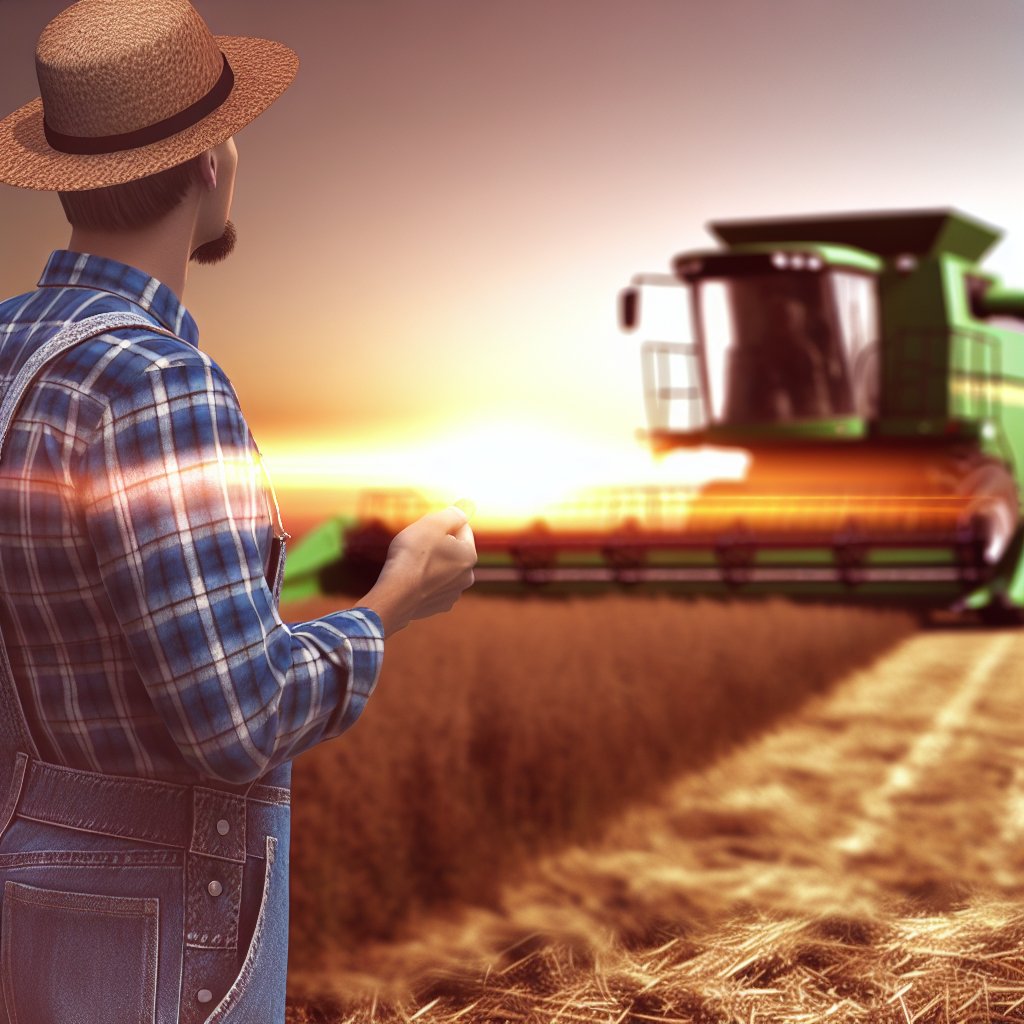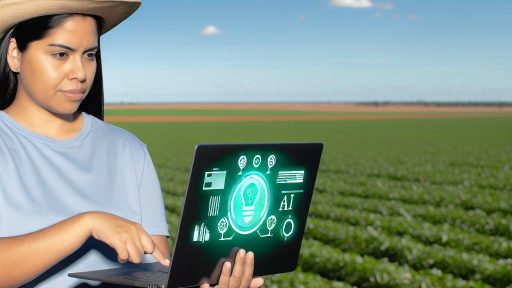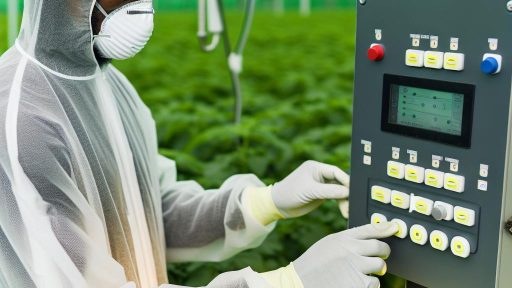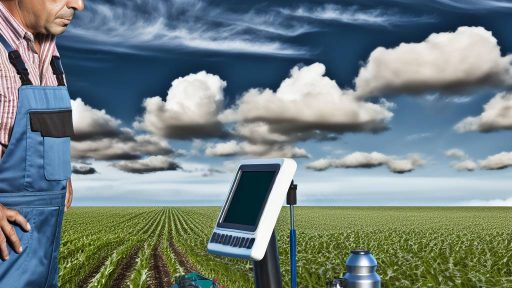Introduction to Automated Machinery in Organic Farming
Automated machinery transforms organic farming practices today.
It enhances efficiency and productivity across various agricultural tasks.
This advancement helps farmers manage their resources more effectively.
Moreover, automation plays a key role in reducing labor costs.
As a result, farmers can focus more on sustainable practices.
Automated systems range from planting machinery to harvesting robots.
They assist in tasks such as irrigation, fertilization, and pest control.
Adopting this technology can lead to higher crop yields.
Additionally, automated machinery helps maintain soil health.
This contributes to the overall sustainability of organic farming.
Furthermore, technology can assist in real-time monitoring of crops.
Farmers can analyze data to make informed decisions quickly.
Embracing automation encourages innovative approaches to farming.
Companies like Agrobotics Inc. lead the charge in this field.
They develop advanced robots tailored for organic farming needs.
Transform Your Agribusiness
Unlock your farm's potential with expert advice tailored to your needs. Get actionable steps that drive real results.
Get StartedThese technologies continuously evolve to meet agricultural demands.
Ultimately, automated machinery paves the way for a sustainable future.
Benefits of Automation in Sustainable Agriculture Practices
Enhanced Efficiency
Automation drastically improves efficiency in farming operations.
It allows farmers to manage their production processes effectively.
Moreover, automated systems reduce the time required for routine tasks.
This efficiency frees up time for farmers to focus on strategic decisions.
Reduction of Labor Costs
Implementing machinery helps to cut labor costs significantly.
Farms can overcome the shortage of skilled labor through automation.
Additionally, machines perform tasks faster than human laborers.
This results in cost savings over time for farming operations.
Consistent Productivity
Automation leads to more consistent productivity levels.
Machines can work in various weather conditions, unlike human labor.
They maintain high productivity, ensuring timely planting and harvesting.
As a result, farmers can depend on regular crop yields.
Data-Driven Decisions
Automated systems often come with advanced data analytics features.
This data helps farmers understand patterns and trends in their operations.
Farmers can make better decisions based on real-time information.
Consequently, they can optimize resource allocation and manage risks effectively.
Environmental Sustainability
Automation supports environmentally sustainable practices in agriculture.
Machines can precisely apply fertilizers and pesticides when needed.
This targeted approach minimizes waste and reduces environmental harm.
Furthermore, it decreases the carbon footprint of farming operations.
Improved Crop Management
Automated technologies enhance crop management techniques.
For example, precision agriculture uses sensors to monitor crops closely.
Showcase Your Farming Business
Publish your professional farming services profile on our blog for a one-time fee of $200 and reach a dedicated audience of farmers and agribusiness owners.
Publish Your ProfileThis monitoring leads to better irrigation and nutrient management.
As a result, crop health and yield improve significantly.
Overview of Different Types of Automated Machinery Suitable for Organic Farming
Seeding and Planting Machines
Seeding and planting machines enhance efficiency in organic farming.
These machines precisely place seeds at optimal depths.
Additionally, they can adjust seed spacing based on soil conditions.
For example, companies like EcoSeed offer innovative planting solutions.
Weeding Robots
Weeding robots play a vital role in organic weed management.
They identify and remove weeds without harming crops.
Using AI, these robots improve precision and reduce labor costs.
Popular models include the FarmWise weeding robot.
Harvesting Equipment
Automated harvesting equipment effectively speeds up the harvest process.
These machines minimize damage to crops during the harvest.
They are designed to handle a variety of organic produce.
For instance, companies like Octinion specialize in soft fruit harvesting technology.
Soil Management Tools
Soil management tools help maintain soil health in organic farming.
These machines can aerate and improve soil structure efficiently.
They contribute to sustainable practices by promoting soil biodiversity.
A good example includes the use of cover crop seeder machines.
Data Collection and Monitoring Systems
Data collection tools provide valuable insights for organic farmers.
Sensors can monitor soil conditions and crop health in real time.
This data allows for informed decision-making and resource use.
Companies like CropX offer advanced soil monitoring solutions.
Benefits of Implementing Automated Machinery
Implementing automated machinery significantly increases efficiency.
It also reduces the reliance on manual labor, lowering costs.
Furthermore, these tools help maintain organic farming standards.
They support farmers in achieving sustainable agricultural goals.
You Might Also Like: Data-Driven Farming: Leveraging Software For Better Decision Making
Challenges and Considerations in Implementing Automated Technology
Understanding the Integration Process
Integrating automated machinery requires careful planning and execution.
Farmers must assess their existing operations before adoption.
Furthermore, changing traditional farming practices can be daunting.
Training staff on new technologies is essential.
This investment in training can enhance overall productivity.
Identifying Suitable Technology
Many automated machinery options exist today.
Farmers should carefully evaluate which technologies fit their needs.
For instance, precision agriculture tools can optimize resource use.
Additionally, drones can enhance crop monitoring efforts.
Choosing the right tool will depend on farm size and crop type.
Financial Implications
Automated technologies often come with a significant upfront cost.
Farmers need to consider their budget limitations before purchasing.
Nonetheless, these technologies can lead to long-term savings.
Showcase Your Farming Business
Publish your professional farming services profile on our blog for a one-time fee of $200 and reach a dedicated audience of farmers and agribusiness owners.
Publish Your ProfileIn fact, efficient machinery can reduce labor costs significantly.
Moreover, government grants may support technology adoption.
Environmental Considerations
Implementing automation in organic farming raises environmental concerns.
Farmers must ensure compliance with organic standards.
Furthermore, equipment should not disrupt the ecosystem.
For example, machinery should minimize soil compaction.
Ultimately, technology should sustain or enhance ecological health.
Maintaining Flexibility
Farming landscapes and technologies continuously evolve.
Farmers should remain adaptable to future innovations.
Staying informed about new developments is crucial.
This approach enables farmers to adjust their strategies effectively.
Moreover, flexibility helps in coping with market changes.
Delve into the Subject: Selecting The Best Automated Machinery For Small Farms
Integrating Automation with Existing Organic Farming Practices
Understanding Current Organic Practices
Organic farming focuses on natural methods to cultivate crops.
This approach enhances soil health and biodiversity.
Farmers often rely on crop rotation and cover cropping techniques.
These methods enrich the soil and control pests naturally.
Benefits of Automation
Automation can increase efficiency and productivity in organic farms.
For instance, automated systems can manage irrigation more effectively.
Additionally, these systems can reduce labor costs significantly.
Automated machinery can track crop health through advanced sensors.
Choosing the Right Automation Technologies
Farmers should assess their specific needs when selecting technology.
Options include robotic weeders and automated harvesters.
Farmers can also use drones for aerial monitoring of crops.
Each technology must align with organic standards and practices.
Integrating Automation into Farming Systems
Integrating automation requires careful planning and management.
Farmers should begin by evaluating their current systems.
They can then identify areas where automation can add value.
An incremental approach allows for better adaptation to changes.
Training and Support for Farmers
Training is essential for successful implementation of automated systems.
Farmers must learn to operate and maintain new machinery.
Support from local agricultural organizations can be beneficial.
Workshops and online resources help farmers navigate automation.
Monitoring and Evaluating Impact
After integrating automation, farmers should monitor results closely.
Tracking crop yields and soil health will provide valuable insights.
Adjustments may be necessary to optimize the use of technology.
This ongoing evaluation ensures that automation meets organic goals.
Learn More: Precision Farming With Artificial Intelligence

Economic Analysis
Understanding the Costs of Automation
Implementing automated machinery involves significant initial costs.
Farmers must account for the purchase price of the equipment.
Showcase Your Farming Business
Publish your professional farming services profile on our blog for a one-time fee of $200 and reach a dedicated audience of farmers and agribusiness owners.
Publish Your ProfileAdditionally, training personnel to operate this machinery incurs expenses.
Maintenance and repairs also contribute to long-term costs.
Moreover, technology upgrades may be necessary over time.
Consequently, the financial burden can be substantial for small-scale operations.
Assessing the Benefits of Automation
Despite the costs, automation offers remarkable benefits for organic farming.
It enhances efficiency by streamlining various processes.
For instance, automated planting can significantly reduce labor time.
Moreover, machinery can optimize resource usage effectively.
Automated systems can monitor soil health and crop conditions in real-time.
This technology leads to better yield predictions and improved decision-making.
Comparison of Short-term and Long-term Impacts
In the short term, farmers may face higher operational costs.
However, long-term savings can offset these expenses over time.
Automation can lead to reduced labor costs and fewer human errors.
Furthermore, it enables farmers to manage larger areas efficiently.
With improved efficiency, they can focus on higher-quality production.
Case Study: Innovation in Organic Farming
Several farms have successfully integrated automation into their operations.
The Green Acres Farm in California serves as a notable example.
They utilized automated weeding robots to minimize labor dependency.
As a result, their crop yield increased by 30% over two seasons.
Furthermore, they reported a 20% reduction in costs associated with herbicides.
Evaluating Automation in Organic Farming
Ultimately, the decision to automate hinges on individual circumstances.
Farmers must weigh immediate costs against potential long-term gains.
Additionally, assessing farm size and production needs is essential.
For many, the benefits of automation may outweigh the initial expenditures.
Gain More Insights: Enhancing Soil Health with IoT-Based Monitoring Tools
Case Studies of Successful Automated Organic Farms
Green Harvest Farm
Green Harvest Farm utilizes autonomous tractors for planting and harvesting.
This approach reduces labor costs while ensuring precision agriculture.
The farm focuses on crops like quinoa and organic vegetables.
Additionally, they use soil sensors for real-time monitoring of nutrient levels.
This data-driven strategy helps optimize yield and sustainability.
AgriTech Innovations
AgriTech Innovations implements drone technology for crop health analysis.
Drones capture high-resolution images to assess plant vitality.
Farmers receive actionable insights to address issues promptly.
Moreover, they employ robotic systems for weed management.
This reduces the need for chemical pesticides while maintaining crop health.
Harvestable Solutions
Harvestable Solutions integrates AI-driven analytics for predicting harvest times.
Machine learning algorithms analyze weather and soil data.
This information ensures optimal harvesting periods for maximum yield.
Furthermore, they automate irrigation systems based on moisture levels.
As a result, they conserve water and enhance crop growth.
Showcase Your Farming Business
Publish your professional farming services profile on our blog for a one-time fee of $200 and reach a dedicated audience of farmers and agribusiness owners.
Publish Your ProfileEcoFarm Alliance
EcoFarm Alliance showcases a fully automated greenhouse model.
Robotic systems handle planting, watering, and harvesting processes.
This ensures consistent growth conditions for various organic crops.
They also use renewable energy sources, minimizing their carbon footprint.
Consequently, EcoFarm Alliance contributes significantly to sustainable practices.
Verdant Valley Organic Farms
Verdant Valley Organic Farms adopts smart sensors for monitoring conditions.
These sensors track humidity, temperature, and soil quality in real-time.
The data collected directs automated systems to respond accordingly.
Moreover, they train personnel to maintain and troubleshoot the technology.
This hybrid approach enhances both efficiency and product quality.
Future Trends
The Role of AI in Organic Farming
Artificial Intelligence significantly enhances decision-making in organic farming.
Farmers utilize AI to analyze soil health and crop performance.
This technology predicts weather patterns to optimize planting schedules.
Moreover, AI-driven tools help in pest detection early in the growth cycle.
As a result, farmers can minimize pesticide use without compromising yield.
Robotics and Automation Impact
Robotic systems transform traditional farming methods into efficient processes.
Automated tractors and drones streamline planting and harvesting tasks.
These machines operate with precision, reducing soil compaction risks.
Additionally, robots monitor crop health, providing real-time data to farmers.
Consequently, this technology enables timely interventions for better crop management.
Integration of Data Analytics
Data analytics plays a crucial role in modern organic farming.
Farmers can gather extensive information from various sources.
This data informs strategies on resource allocation and crop selection.
Furthermore, analytics assists in understanding market trends and consumer preferences.
As a result, farmers can adapt quickly to shifting market demands.
Challenges and Considerations
Despite the advantages, challenges exist in adopting these technologies.
The initial cost of investment can be significant for many farmers.
Moreover, training is essential for effective utilization of new systems.
Farmers must also navigate technological reliability and data security issues.
Nonetheless, overcoming these barriers leads to sustainable growth in organic farming.
Additional Resources
AI in Agriculture and Farming: Revolutionizing Crop Growth – Intellias




